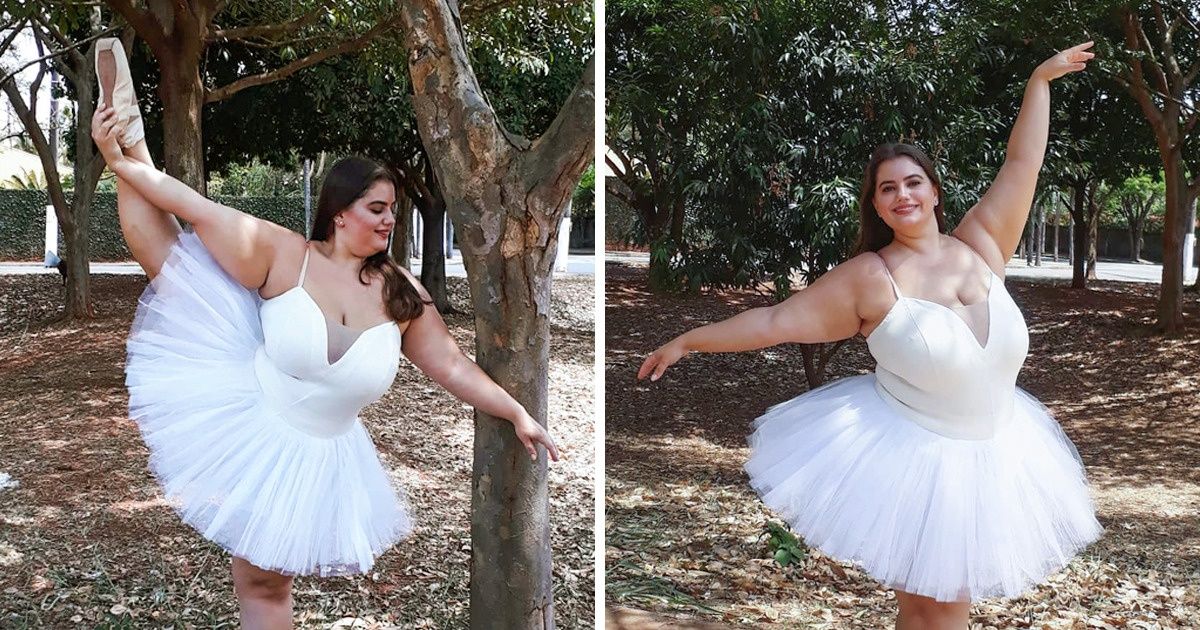Bravo
A Plus-Size Ballerina Shared Her Journey to Prove Not Only “Perfect” Bodies Can Dance

Júlia Del Bianco is a dancer who has dedicated over 30 years to dancing and everything related to it. She also has a degree in dance from the University of Campinas (Unicamp) in São Paulo, Brazil. Not only that, but she is also the mind behind the school, “Dance For Plus.” There, she offers ballet classes to anyone who wants to take them, regardless of what type of body they have, setting aside all stereotypes imposed by society.
Bright Side spoke with Júlia to learn more about her impressive story that shows how she has fought and persevered until the end in order to make her dream come true.
Júlia started practicing ballet when she was very young: “I started when I was barely 3 years old, I was still in kindergarten. Then, when I turned 6, I went to a specialized dance academy. Today I’m 33, so that makes 30 years of dancing experience in total. I’ve always danced and always wanted to dance. I don’t remember consciously choosing ballet or even thinking about becoming a dancer because, for me, it was sort of the obvious thing to do, I always wanted to do it. I can’t really split my life from dancing, they’re one and the same thing.”
At first, Júlia found it difficult to match 2 things that seemed opposite: a dance style that was seemingly created for people with an extremely thin and slender body and her own curvy figure.
“I started with ballet at a very young age and had no problem getting into it. But as a teenager, the way I was treated changed because even though I was thin, I didn’t fall under the category of ‘ballerina body.’ My body was curvier than what people expected to see. This limited me in many ways, as some people in the industry would immediately relate that to my ability to dance. It didn’t matter that I had good technique and lots of experience. They’d focus on the fact that I didn’t have the ideal body, so at some point, I also came to think that I wasn’t good enough of a dancer. I didn’t even feel I was worthy of pursuing the opportunities that came my way because I didn’t have the body that people expected me to have.”
“Since I never really had what people understand to be a standard body, many people told me that I should give up on ballet. People who already danced, friends, or even more distant relatives came to the same conclusion. Fortunately, my desire to dance was always stronger than that, so I was determined and kept going,” she told us. And luckily, she kept chasing her dreams, and in time, she would manage to prove that she was capable of dancing just like anyone else.
The image portrayed by ballet in general, and especially by its major companies, can easily become counterproductive and even outdated when it comes to thinking about this activity in a different way. “Such restrictions in how a person should look limits us to think of dancing only as a profession and not as something that can be done for pleasure or fun,” Júlia explained. “It can even prevent us from seeing ballet as a type of art that can make us feel complete.”
“The standard body that is asked of dancers also has a lot to do with trends. Today, we’ve finally come to realize that an extremely thin body can often be an unhealthy thing to ask for, but it wasn’t always like that. In fact, that still leads many dancers to push their physical limits just to meet such a standard.”
Júlia has her own dance school, which she opened a few years ago. “When I started to post my pictures and videos as a model and dancer on social media, I received many messages from people sharing their own experience with dance. In most of these messages, people’s bodies limited them, and in many cases, it even made them quit dancing altogether. There were cases of harassment by other dancers or even by teachers, sometimes even by parents, who sometimes refused to enroll their daughters in ballet lessons just to prevent them from suffering from discrimination,” said Júlia.
“Since I’m an educator with a degree in dance, I decided to apply my knowledge and the principles I was already using to teach classes, but this time, for the plus-sized public or for the people who did not feel comfortable and represented by traditional dance schools. For me, dance and ballet are made for everyone, so creating ’Dance For Plus’ was a way to put this philosophy into practice.”
“’Dance For Plus’ is a concept that goes beyond having a certain number of students and an online school. It’s a community that proves to the world that dance doesn’t have to be a punishment to your body or something that you do to look like what others expect you to look like. Instead, it’s a fun, pleasurable activity that brings well-being. Dance For Plus is a place to enjoy this wonderful art form as much as possible. It has a different approach than traditional academies,” Júlia explained when we asked about her school, where anyone can now take classes online.
New generations are making a difference in the world, and one can only hope that in the near future no one will have to suffer from discrimination or feel uncomfortable with their own body when thinking about dancing. “You need to find a welcoming place that accepts your figure as it is,” Júlia said. “No one can evolve if they are in a pressured environment, especially if their goal isn’t to practice dance at a professional level. A trained professional who knows how to deal with different types of bodies, and by this I’m referring to the instructor but also to the school staff, can really make a difference.”
“Just do it. Don’t expect everything to be perfect or for you to have an ideal body. Don’t put off something that does you good out of fear. If we don’t take risks and don’t give things a try, we will make the mistake of thinking that we can never get it right. Yet it’s possible to work on motor coordination, flexibility, and rhythm. The accomplishment of doing what triggers you should not be put on hold,” said Júlia in a final piece of advice. Undoubtedly, this is an inspiring way to encourage people to do what they want to do without being influenced by what society throws at them.
Did you ever feel discriminated against when you wanted to practice a sport or enter a profession? Why do you think that happened? Would you give it a try again today?
Comments
See I agree we should normalize plus size people but extremely obesity should not be normalized
she's so cute
Cute like an elephant
Related Reads
11 People Whose Small Acts of Kindness Turned Tears Into Smiles

15 Real-Life Moments That Prove Quiet Kindness Is a Real Power Move

I Absolutely Refuse to Give Up My Apartment for My Sister and Her 3 Kids

I Found Out My MIL Was Sabotaging My Gender Reveal—Now I’m the Family Villain

HR Fired Me Right Before My Vacation, So I Used It Against Them

I Refused to Share My Inheritance With a Family That Didn’t Accept Me

I Refused to Put My Health at Risk Because of My Job, Now HR Got Involved

10 Stories That Prove Work-From-Home Isn’t Always What HR Promised

I Charged My MIL for Christmas Dinner, Even Though She’s Always Helped Us for Free

I Refuse to Give Up the Passenger Seat for My MIL—She Should Learn Her Place

14 Powerful Kindness Stories That Restored Hope in Tough Times

My Parents Abandoned Me at 18, Now They’re Begging for My Forgiveness
